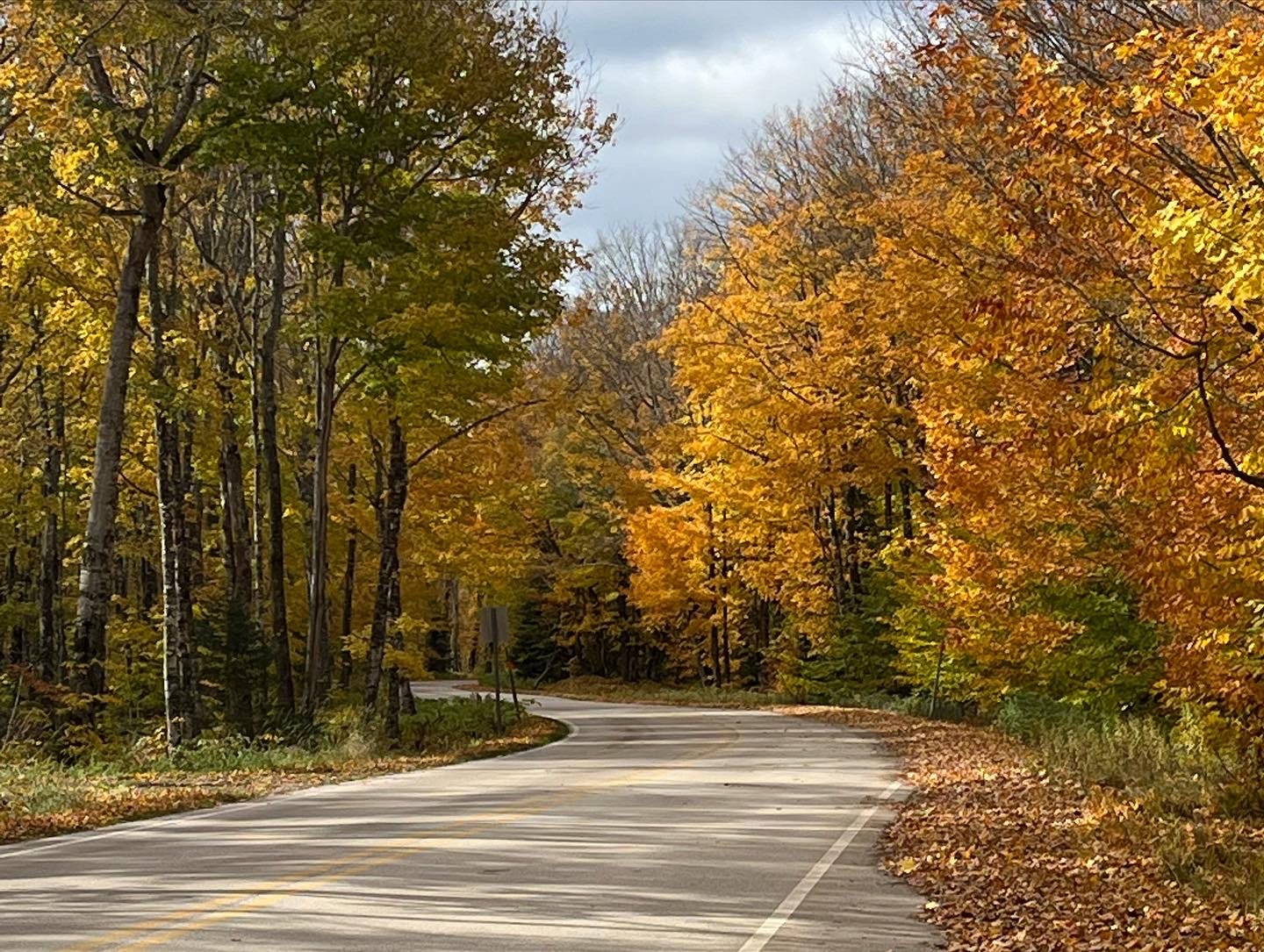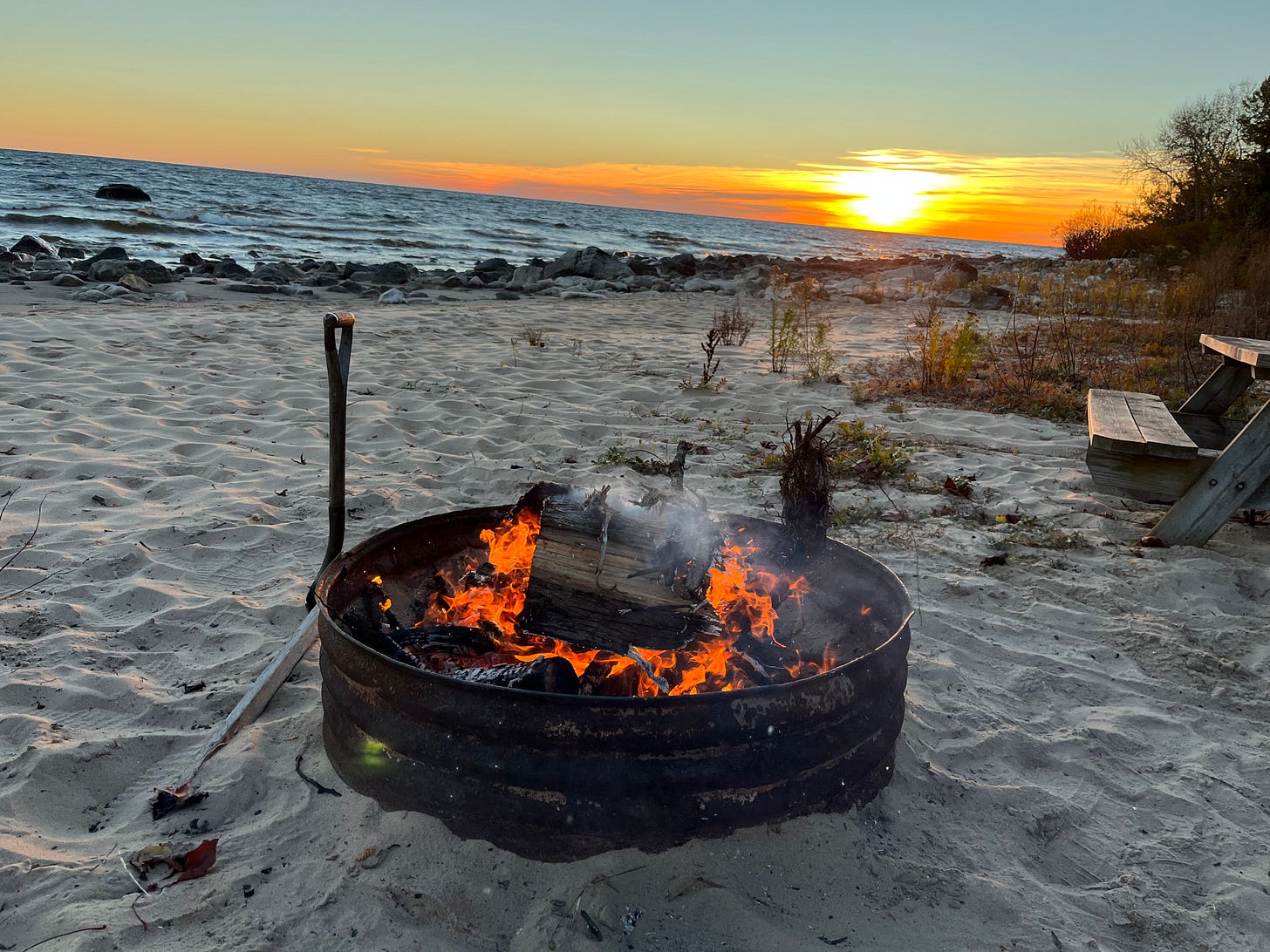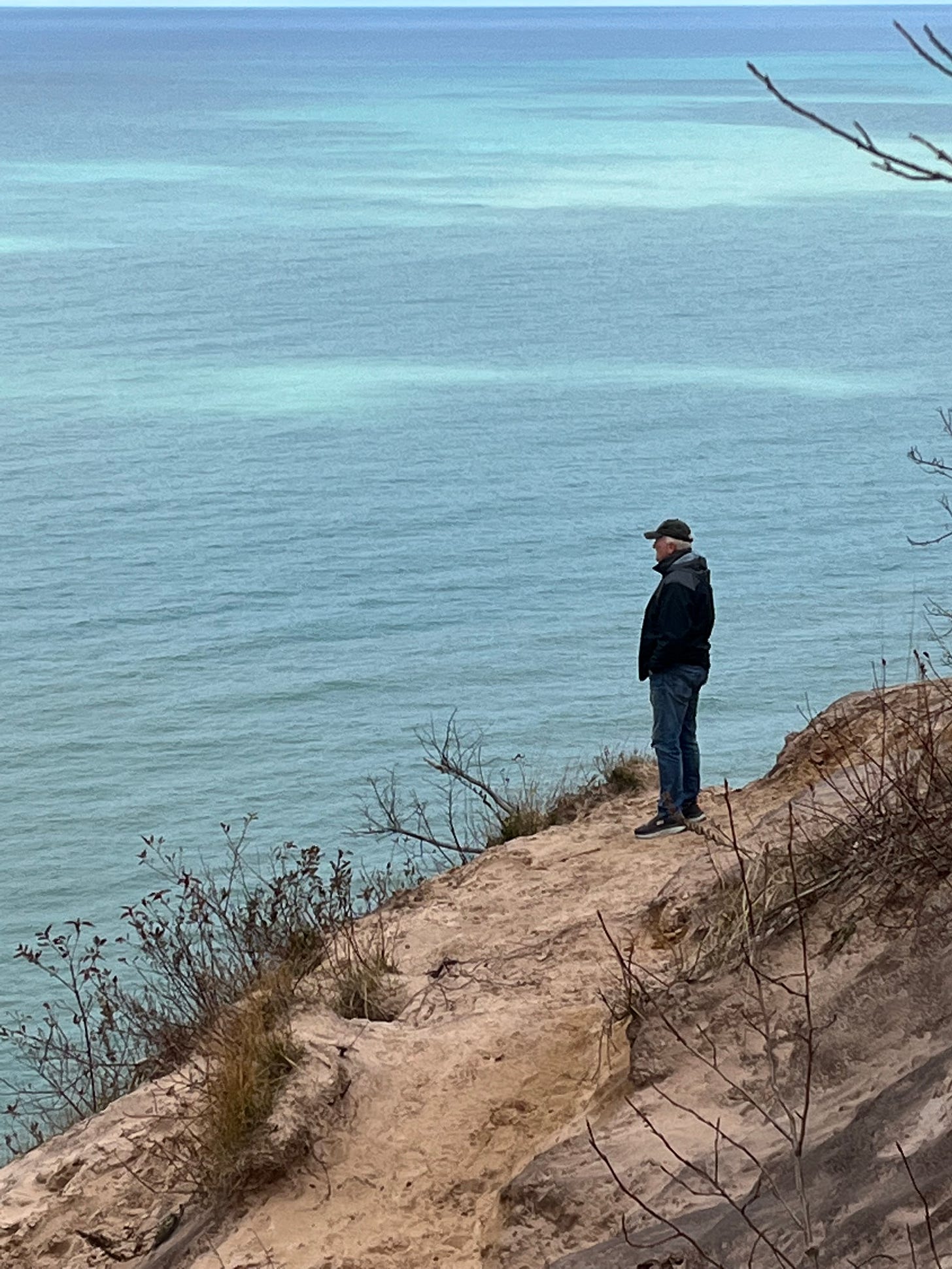Way Up North
“What is it the wind has lost that she keeps looking for under each leaf?”
― Jim Harrison, Michigan author, “Braided Creek: A Conversation in Poetry”
The heat in Texas finally became too much for me, which is a significant development in my life. I have always loved the warmth of the state, and summers rarely got to the point where I decided to stay indoors. I still ran, rode my bicycle for distances, and sat the motorcycle all day in the sun for long trips. In my youth, to celebrate the nation’s bicentennial, I ran a marathon in the Rio Grande Valley on July 4th in the steaming sub-tropical weather. Never mind that I finished by lying in a puddle next to the courthouse in Edinburg, covered with ice, barely breathing. I do not think anyone from Concord Green would have been impressed.
We went north to Michigan recently, where the summer weather is as idyllic as autumn in Texas. The winters here were a major factor in my departure. The only relief from the eternal slate gray skies and the suicide cold was a rare Chinook wind blowing odd warmth from across Canada. Grass often turned green very early, though, in late March, and hopeful little leaguers started fielding grounders only to find their sandlot diamonds a few days later covered with a foot of snow. I recall a highly-anticipated Memorial Day picnic that got blown to an early conclusion by a Canadian Clipper of sleet that turned to three inches of snow in an hour. No young man’s heart breaks more frequently than one who waits on a Michigan summer.
I am reconsidering my home state these days, though, not as a place to live, but as a place to lead. The West has always been the home of my soul, and always will be, but there are many manifest reasons to take another look at this peninsula surrounded by great waters. The state has probably given American culture as much literary greatness as Texas. Geography and weather have been formative powers in the work of writers like Jim Harrison and Ernest Hemingway, who both discovered their love of nature in the north woods up here and along the many rivers of Michigan’s Upper Peninsula and the lakes of the upper reaches of the Lower Peninsula. The Big Two-Hearted River, which was possibly Hemingway’s greatest short story, was written about a fishing trip in the UP, experienced by a soldier home from the Great War, and became an allegory for desolation and destruction overcome by nature’s glorious recuperative powers for people.
The Scene Come Some October Michigan Morning
While Hemingway spent his summers on Walloon Lake in Northeastern Michigan, coming up from Oak Park, Illinois, Harrison was raised in the upper half of the mitten. There are not many pages of his stacks of books on poetry, novels, and non-fiction works that do not have the rivers of Michigan running through their language. He became a very public gourmand and chef, famous for his appetites for exotic foods and wines, his love of dogs and birds, hunting, and, yes, even pigs. (He did not rent them, though.) His novels deal with the usual themes of love and loss along with the complications of age and sex, mixed in with humanity’s dark abilities to destroy good things. The novella he wrote, Legends of the Fall, was his most famous work because of the movie, which bears the same title and is driven by the pains of war and unrequited love. Harrison grew up on the banks of the Au Sable River, a gently flowing water course that crosses Michigan from west to east and carried furs and timber to Lake Huron traders. The river is now populated mostly by canoeists from the industrial cities to the south and college students.
Michigan is not, however, the exclusive province of hairy-chested male authors. Texans will certainly be surprised to learn that Edna Ferber, author of Giant, still the definitive book on the state’s ranching wealth and the Hispanic-Anglo divide, was born in Kalamazoo, Michigan. Although probably still best known for the Texas novel, Ferber’s So Big, published in 1924, won the Pulitzer for fiction. Terry McMillan, whose books Waiting to Exhale and How Stella Got Her Groove Back, has sold millions of copies, which became popular movies focusing on the experiences of black women in modern American culture. She was born and raised in Port Huron, Michigan, just across the Bluewater Bridge from Sarnia, Ontario. Judith Guest, too, was a child of Detroit, and her novel, Ordinary People, became the basis of the eponymous Oscar-winning film.
There are, of course, many other writers of both genders from Michigan whose work has added to English letters, but this is not a place for a regional history of literature. It is, however, time to mention another Michigan woman who has begun attracting political, rather than literary attention. Gretchen Whitmer has twice defeated Republican opponents by double digit margins in the race for the governor’s office and has become a leading voice for Democratic politics in national discussions on complex issues. Whitmer has been given credit for repairing more than 20,000 lane miles and 1400 bridges in the state during recent years, which supported more than 118,000 jobs. Ford, General Motors, and Stellantis, have all added 36,000 auto jobs to the state’s payroll since she became governor, too. While signing bi-partisan balanced budgets, Whitmer convinced state lawmakers to pay for a free breakfast and lunch for 1.4 million school age children, and she accomplished it without raising household taxes, according to her office, by “even a dime.” Instead of deleting children and economically disadvantaged from Medicaid rolls like Greg Abbott of Texas, Whitmer has expanded the health care coverage to a million more residents of her state.
Lake Michigan Shoreline, Upper Peninsula of Michigan
After Trump narrowly carried her state, Whitmer began a rise built on what is best described as political pragmatism. She found ways to get Republicans to agree with her on methods to fund road repair and fix water infrastructure while also protecting the environment. Whitmer linked her candidacy to a statewide constitutional amendment that guaranteed a right to an abortion and she has since taken progressive political steps like providing protections for LGBTQ people while also getting rid of Michigan’s Right to Work Laws, which hamper union membership and collective bargaining strength. The repeal of those measures had not happened anywhere in the U.S. for 58 years prior to Michigan’s legislative change. The governor’s story, though, is much more detailed and nuanced than this space can accommodate, but its importance is demonstrated in the fact that Democrats control both chambers of the state legislature and the GOP is weighted with stories of divisive argumentation and a disability to organize.
Michigan’s economic ascent is not co-dependent on Whitmer’s rise, though she has certainly been instrumental in an economic turnaround by bringing new automotive jobs to the state made famous by Ford and General Motors. Michigan, though, is getting attention for lifestyle positives and what appears to be an endless supply of fresh water. While the Southwest frets about drying aquifers and the snow melt in the Colorado River Basin, Michigan is surrounded by giant inland seas of freshwater and is estimated to have about 12,000 lakes. No place, especially in the north, feels crowded, and unlike cities in Texas where starter homes are over $400,000, young families up here can get launched on home ownership and building equity for $200,000 to $300,000. Unemployment is also only 3.6 percent, and all this has been accomplished without denying workers water breaks or spending billions or infrastructure on human resources to keep people out of the state.
Successful governors, of course, immediately become presidential timber, and Whitmer’s profile will continue to rise. Democrats who are convinced President Biden will abdicate his party’s candidacy before the national convention, dream of a ticket with the names of Whitmer and California’s Gavin Newsom. I am more inclined to the idea of Whitmer and Georgia’s U.S. Senator Rev. Raphael Warnock. Their partnership would guarantee that radical conservatives coming for the rights of any group of Americans would face a hell of a fight. That duo would also be capable of building coalitions and bipartisan collaborations that would formulate policies to advance the American story. Whitmer and Warnock probably will not happen in this election cycle, but four years flies by fast in presidential politics, and I suspect their names will be linked constantly in discussions by Democrats.
On a Recent Trip to the Shores of the “Big Lake They Call Gitche Gumee”
Regardless, I have been convinced for some time that the old Rust Belt states will be revivified in the coming years. Manufacturing companies that moved to the Southwest will continue to need water, which will continue to disappear in climate change droughts and improper use. The heat will make life more unbearable than the Midwestern winters, which are increasingly more temperate as the planet warms. Further, housing costs up here owning a home more accessible to almost every range of wage earners, and if you are like Jim Harrison, you can look out your back door and see woods and trails and rivers and lakes. If you don’t, they are usually a short drive distant from your front door.
I have not known my home state well. Growing up, there were no resources for the family to explore what was then known as the “Water Winter Wonderland.” What we wondered about was when it might again get warm. I did not see a great lake until I was 17 and hitchhiked over to Port Huron, just over an hour from where I was raised with my five siblings. I have seen Michigan with smarter eyes on this trip, and have felt the soft rains that fall often and keep the landscape green and flowering. Too many roads are still broken and bumpy, though, torn apart by the heat and ice and heavy traffic, but there is a scent of a new prosperity in the air.
Tech companies are moving into downtown Detroit and the major universities are attracting the best and the brightest, who will further transform Michigan and return the reputation it had in the latter half of the previous century when people raced to be here from all across America. Michigan was where the jobs were, the technology building the latest in automotive excellence, the new musical culture of Motown, and shining neighborhoods filling up the pastures and pine groves with workers home from the war, hoping for a prosperous and peaceful future.
Or maybe it hasn’t change that much. And I have. I am no longer the youthful hitchhiker with his thumb out in a hurry to cross the state line heading south. I am not a candidate to move back here, though, because too much of what I love and know and am connected to is a part of Texas and the Southwest. I will never be able to leave permanently, nor do I want to. I suspect, however, I will have to escape for a while in the summer, and find a spot for a few months where the sun is not so dangerous in the changed world.
And I think I might know a place.






well said.... (If you seek shelter from the heat, drought and hostile politics, return to Michigan, my friend.
Well put, presented, a great pleasure to read, and definitely intriguing. I think you're on the mark with Whitmer, too. You've also spoken to me at length about leaving Taos, and I've been enough places that I feel homesick for virtually all of them depending on the time of year in northern New Mexico or something that I've read about another place I'm not. My situation is that I'm not "at home" anywhere specific, though. It has to be the whole damn Earth or nothing. And I've come to think my purpose in this life has mostly been to wander deep in the unconscious. That's mostly all I've ever done. Inner rather than outer. Now I think I'd simply like to laugh again and that it doesn't matter where I live—until I start to think about relocating all over again and doubt myself. By the time this settles out, if it ever does, I'll probably already be dead. Now there's a joke from up on high.